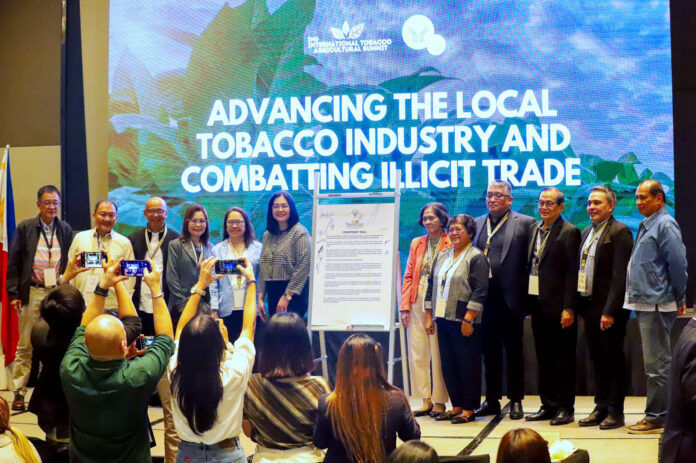Over 200 key stakeholders, including top government officials, industry leaders, and experts, gathered from 27 to 28 January for the Second International Tobacco Summit in Quezon City, focused on combating the rising illicit tobacco trade in the Philippines. Spearheaded by the National Tobacco Administration (NTA), the summit underscored the growing economic impact of illegal tobacco trade, which has resulted in billions of pesos in revenue losses for the government.
At the summit, discussions centered on strategies to strengthen enforcement of Republic Act No. 12022, the Anti-Agricultural Economic Sabotage Act, aimed at protecting local farmers and legitimate businesses. Present at the event were officials from key agencies like the Bureau of Internal Revenue (BIR), Bureau of Customs (BOC), and the Department of Agriculture (DA), as well as industry representatives, including the Federation of Philippine Industries and Universal Leaf Philippines.
NTA administrator Belinda Sanchez emphasized the need for a collaborative approach to combat illicit trade, highlighting the importance of integrating regulation, community engagement, and education. Meanwhile, BOC deputy commissioner Juvymax Uy revealed that 437 enforcement operations in 2024 led to the confiscation of counterfeit tobacco products worth an estimated P9.3 billion.
The issue of illicit tobacco trade is particularly pressing as the Philippine tobacco industry is projected to generate USD7.3 billion in 2024, with a 2.67 percent annual growth rate through 2029. BIR Commissioner Romeo Lumagui Jr. noted that the illicit market is a significant source of revenue loss, further exacerbating the economic impact.
Drawing comparisons to Malaysia’s response to similar challenges, Japan Tobacco International’s Shaiful Mahpar pointed to the importance of strong enforcement measures alongside excise tax policies to prevent illegal trade and protect government revenue.
The government’s intensified crackdown, including over P2.3 billion worth of smuggled tobacco products seized by the Department of the Interior and Local Government (DILG), reflects a concerted effort to tackle the issue at both a national and regional level. Authorities are now focusing on greater inter-agency collaboration and more aggressive regulatory reforms to dismantle smuggling networks, safeguard local industries, and protect billions of pesos in tax revenues.
With the stakes high, the push for stronger enforcement and strategic international partnerships continues as the Philippines aims to reduce illicit trade and secure a fairer, more sustainable tobacco market.







